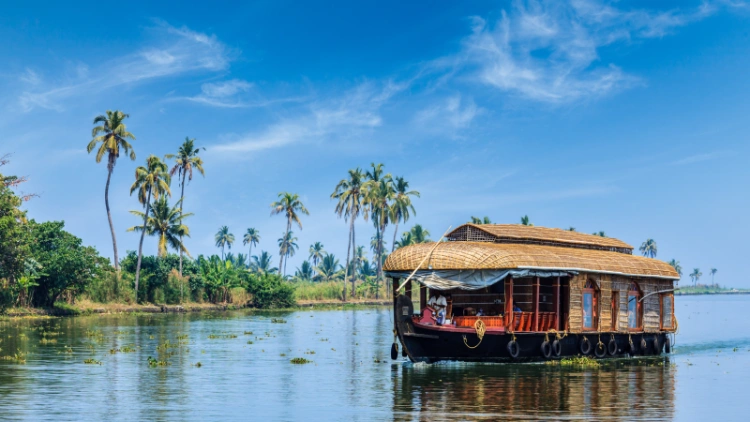The Kerala Backwaters are not just a stunning natural wonder; they are also a site of immense cultural and ecological significance. Recognized by UNESCO for their unique biodiversity and cultural heritage, the backwaters are a global treasure that deserves preservation and appreciation. In this guide, we’ll explore why the Kerala Backwaters are a UNESCO World Heritage site, their ecological importance, cultural significance, and how you can experience this global treasure responsibly.
Why Kerala Backwaters are a UNESCO World Heritage Site
The Kerala Backwaters have been recognized by UNESCO for their unique blend of natural beauty, biodiversity, and cultural heritage. This recognition highlights the importance of preserving the backwaters for future generations.
Ecological Importance of Kerala Backwaters
1. Biodiversity Hotspot
The Kerala Backwaters are home to a diverse range of flora and fauna, making them a biodiversity hotspot.
What to Know:
- Flora: The backwaters are rich in aquatic plants, mangroves, and coconut palms.
- Fauna: The region is home to numerous species of birds, fish, and other wildlife.
- Endemic Species: Some species found in the backwaters are unique to this region.
Tips:
- Visit the Kumarakom Bird Sanctuary to spot migratory and resident birds.
- Take a guided tour to learn about the local flora and fauna.
2. Unique Ecosystem
The backwaters are a unique ecosystem that supports a variety of life forms.
What to Know:
- Lagoons and Lakes: The backwaters consist of a network of lagoons, lakes, and canals.
- Brackish Water: The mix of freshwater and seawater creates a unique habitat.
- Mangroves: Mangroves play a crucial role in protecting the coastline and supporting marine life.
Tips:
- Explore the mangroves to understand their ecological importance.
- Participate in eco-tours that focus on conservation and education.
3. Sustainable Practices
The traditional practices of the local communities contribute to the sustainability of the backwaters.
What to Know:
- Coir-Making: The use of coconut husks for coir-making is an eco-friendly practice.
- Fishing: Traditional fishing methods are sustainable and do not harm the ecosystem.
- Agriculture: The cultivation of rice and other crops is done in harmony with nature.
Tips:
- Support local communities by buying eco-friendly products.
- Learn about traditional practices during village tours.
Cultural Significance of Kerala Backwaters
1. Traditional Houseboats
The traditional houseboats, or Kettuvallams, are an integral part of the cultural heritage of the backwaters.
What to Know:
- Construction: Houseboats are made using natural materials like bamboo and coir.
- Design: The design of the houseboats reflects the traditional craftsmanship of Kerala.
- Usage: Originally used for transporting goods, houseboats are now popular among tourists.
Tips:
- Stay on a traditional houseboat to experience the cultural heritage.
- Choose eco-friendly houseboats that follow sustainable practices.
2. Festivals and Rituals
The backwaters are home to numerous festivals and rituals that reflect Kerala’s cultural heritage.
What to Know:
- Onam: The most important festival in Kerala, celebrated with feasts, dances, and boat races.
- Vallam Kali: Traditional snake boat races held during the monsoon season.
- Temple Festivals: Various temple festivals are celebrated with traditional music and dance.
Tips:
- Plan your visit during festivals to experience the cultural vibrancy.
- Respect local customs and traditions during festivals.
3. Art and Literature
The backwaters have inspired numerous works of art and literature.
What to Know:
- Kathakali: A classical dance-drama known for its elaborate costumes and expressive movements.
- Mohiniyattam: A graceful dance form performed by women.
- Literature: Many writers and poets have been inspired by the beauty of the backwaters.
Tips:
- Watch a Kathakali or Mohiniyattam performance to appreciate the art forms.
- Read literature inspired by the backwaters to gain a deeper understanding.
How to Experience Kerala Backwaters Responsibly
1. Choose Eco-Friendly Accommodations
Stay at eco-friendly houseboats, resorts, or homestays that follow sustainable practices.
Tips:
- Look for certifications and reviews that confirm eco-friendly practices.
- Avoid accommodations that contribute to pollution or harm the ecosystem.
2. Support Local Communities
Support local communities by buying local products and participating in community-based tourism.
Tips:
- Buy handicrafts, coir products, and other local goods.
- Participate in village tours and cultural activities organized by local communities.
3. Minimize Environmental Impact
Take steps to minimize your environmental impact while visiting the backwaters.
Tips:
- Avoid using plastic and dispose of waste properly.
- Use eco-friendly products and practices during your stay.
- Conserve water and electricity.
4. Respect Local Culture
Respect local customs and traditions while visiting the backwaters.
Tips:
- Dress modestly and follow local etiquette.
- Ask for permission before taking photos of people or sacred sites.
- Participate in cultural activities with respect and enthusiasm.
Personal Experience: Exploring the UNESCO-Recognized Kerala Backwaters
During my visit to the Kerala Backwaters, I was amazed by the natural beauty and cultural richness of the region. Staying on an eco-friendly houseboat allowed me to experience the serene environment while minimizing my environmental impact. I also participated in a village tour, where I learned about traditional practices like coir-making and fishing. The highlight of the trip was attending the Onam festival, where I enjoyed traditional dances, feasts, and boat races. It was a truly enriching experience that highlighted the importance of preserving this global treasure.
Conclusion
The Kerala Backwaters are a UNESCO World Heritage site that offers a unique blend of natural beauty, biodiversity, and cultural heritage. With this guide, you’re all set to explore and appreciate this global treasure responsibly. Whether you’re staying on an eco-friendly houseboat, participating in cultural festivals, or learning about traditional practices, the backwaters promise a memorable and enriching experience.

